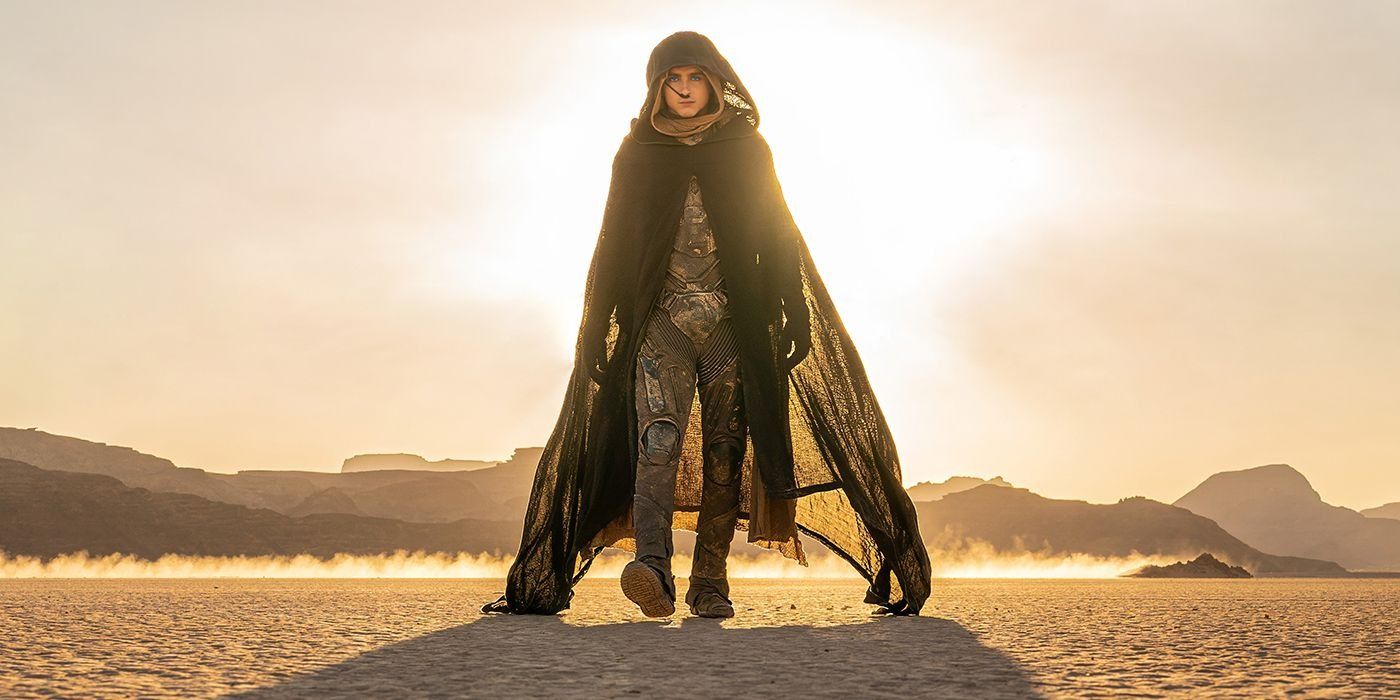
Another movie, another generation of moviegoers misunderstanding the plot. From Starship Troopers, to Fight Club, to American Psycho, audiences have consistently shown that they don’t care to look past the most surface-level details of the art they consume. Games have plenty of their own examples, from Helldivers 2, to Warhammer 40,000, to The Last of Us (the combat isn’t meant to be fun!) And people laugh at Media Studies being taught in school.
Audiences have removed their brains in cinemas worldwide this weekend as Dune: Part Two opened its doors and showed them the weirding way. Despite Frank Herbert’s clear message of the ill-effects of colonisation, religious zealotry, and the dangers of fanaticism, and Denis Villeneuve’s even more explicit adaptation, people seem to have come away from the film seeing Paul ‘Muad’dib’ ‘Usul’ Atreides as the hero.
On the surface level, I almost get it. This is a story of revenge, in which we are meant to root for Paul. His father was killed by the Emperor and the Harkonnens, and he wants to avenge his family’s death. However, to do so he must ally with the Fremen people of Arrakis, who want the Harkonnens gone for their own reasons, and juggle the prophecy his mother is perpetuating. Amid all of this, he has visions of the future that show his religious jihad will wage across the galaxy, killing billions. It’s a future that he initially wants to avoid at all costs, but later comes around to thinking is the only option.
If you only read that surface-level plot of the film, then I can see how you see Paul as a maligned hero, perhaps even an antihero, who makes the wrong decisions for the right reasons. But in doing so, you’re missing the sand for the dunes, you’re standing on the spice fields instead of delving that little bit deeper into the Fremen sietches.
Beneath the surface, Dune is a story about religious fervour, about control, and about a white saviour using a superstitious people for his own ends. This is shown obviously through the Bene Gesserit, who have been manipulating bloodlines and sowing the seeds of superstition among the people of Arrakis for centuries. They seek to control the galaxy by controlling the Emperor, and are happy to control entire planetary populations to seat their heir on the throne. Paul’s mother Jessica defies this directive, using the Bene Gesserit prophecies for her own, and Paul’s, ends, but still works to manipulate and control.
While Paul may seem like an odd name for a science fiction protagonist, I always believed it was a reference to the Bible. Paul (known as Saul before his conversion) became the Apostle to the Gentiles, preaching the ways of God to non-believers. The power of name changes is also hugely important in Dune, with Paul (Atreides) becoming Usul and Muad’Dib as he lives with the Fremen.
There has been online outcry about Jessica ‘appropriating’ Muslim culture with her costumes in the Villeneuve film. This is the point. She’s a white woman infiltrating a culture that she has attempted to control for decades. This isn’t a poor choice from the film’s costume department, it’s a crucial piece of the controlling puzzle. It’s not even subtext, this is text.
If you really want proof that this is the ‘point’ of Dune, if we can even distil any novel down to one single throughline, just look to interviews with the author himself.
“It began with a concept: to do a long novel about the messianic convulsions which periodically inflict themselves on human societies,” Frank Herbert is quoted as saying in Tim O’Reilly’s biography. “I had this idea that superheros were disastrous for humans.”
Herbert reiterates the point in the introduction to his short story collection, Eye: “Dune was aimed at this whole idea of the infallible leader because my view of history says that mistakes made by a leader (or made in a leader's name) are amplified by the numbers who follow without question.”
But it’s not just moviegoers who misunderstand Herbert’s message, book readers were equally culpable when the original novel was released in 1965. So much so that Herbert wrote the entirety of Dune Messiah in order to spell it out to readers. Paul’s not a good guy, much less a Good Guy.
Dune: Part Two director Denis Villeneuve completely understands that sentiment, and made a few crucial changes to the plot in order to further aid audience comprehension.
The most egregious change is the reason for Paul’s journey to the south of Arrakis. He refuses to go initially – as in the book – but his decision is driven by the Harkonnen attack on Sietch Tabr, rather than his prophetic dreams stopping. Even then, he’s more reluctant, more introspective, and more attuned to Chani’s feelings.
Maybe this led to viewers putting him in the ‘reluctant hero’ category like Peter Jackson’s Aragorn (another departure from the source material). But if you, a viewer, agree with the followers of Lisan al-Gaib, like Stilgar and the southern Fremen, who are explicitly shown to have been manipulated into believing false prophecy, then you’re a lost cause.
I wonder if some miscomprehension derives from the 1984 David Lynch movie adaptation, which ends with the rain falling on Arrakis, painting Paul as a saviour rather than tyrant and warlord.
Villeneuve makes it extremely clear that Paul is not this story’s hero, even if he is the protagonist. Another crucial decision is splitting the Fremen into two groups, with Chani leading the sceptics. Chani’s role is expanded, and her perspective sees Paul as the white saviour that he is. She watches her lover change from an honourary member of the Fremen collective to a ruling messiah in real time. Her role is to show the viewer, in incredibly obvious terms, how Herbert’s infallible leader can cause irreparable damage, and how easily his religion can take over the Fremen.
The ending of Dune: Part Two shows Paul sending his Fremen troops to attack the great houses orbiting Arrakis. It’s the beginning of his religious jihad, his galaxy-wide war that he has foreseen will lead to billions of deaths. To him, it’s the best case scenario of the hundreds of potential futures he sees open out ahead of him. To billions of innocent people, it means death and destruction. Chani sees this reality, and so should you.
Next: A Big New Game Releasing The Same Day As A Big New Movie Is Peak Entertainment













